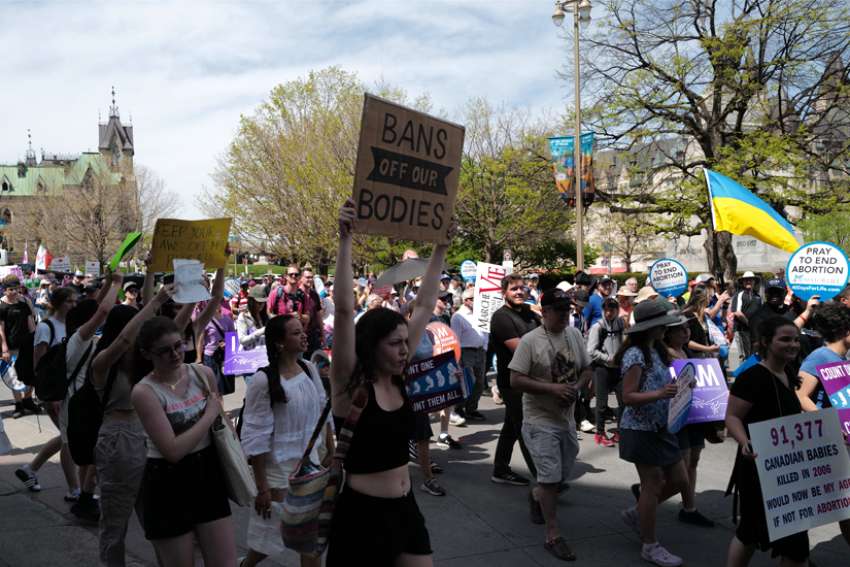Standing in the blazing noonday sun, they listened to speeches, held up signs, prayed and marched through downtown Ottawa to express their solidarity with the pro-life movement, which has gained untold momentum from the leaked U.S. Supreme Court draft decision that a majority of justices are prepared to overrule the landmark Roe v. Wade case that protected the rights of American women to seek abortions.
“May 14, 1969, Canada’s Day of Infamy,” read a sign held up by a young woman, signifying the day former prime minister Pierre Trudeau's Liberal government decriminalized contraception and allowed abortion under certain circumstances.
This year’s March for Life marked the 25th year of the annual event, which has drawn an increasing number of people concerned that the country is drifting closer to a “culture of death,” as one marcher phrased it.
The message of the pro-life marchers to the politicians and decision-makers of Canada on behalf of the unborn was loud and clear — “I am” as proclaimed by several signs, meaning: “I exist as a human being, with a right to life.”
Fr. Luc Poirier, a priest at St. Irénée de Lyon in Montreal, arrived in Ottawa with a group of approximately 60 to 70 parishioners.
“It’s time to make a change, a time when our testimony is most important,” he said. “By supporting abortion and euthanasia, the world is going towards a culture of death. We need to be witnesses to the right to life and light, and the human rights of all. With our pro-abortion government, there is no legal protection for the unborn in Canada. This is why the march is so important.
“We are here to give a voice to those who don’t have a voice,” Archbishop Marcel Damphousse of Ottawa-Cornwall told the cheering crowd. “We believe in the God-given dignity of every human life that none can take away.”
“Every life is an irreplaceable gift,” Sr. Maria of the Sisters of Life, a Catholic religious community of women consecrated for the protection of human life, said in her speech. “Our worth does not depend on who we are or what we can accomplish, but simply because we are. We (Sisters of Life) walk with women across Canada, and give them hope and healing after abortion.”
Quoting their founder Cardinal John Joseph O’Connor of New York, Sr. Maria continued: “If all the marches can save one human life, Our Lord will say to us: ‘Well done thou good and faithful servant.’ ”
The march drew a large crowd of young people, including Minnie Chen, 25, a recent graduate of the University of Ottawa’s political science faculty and a member of Ottawa’s Parkdale Baptist Church.
“It is so important to protect all life,” said Chen. “I was born in China and grew up with the Chinese government’s One Child policy, then my parents moved to Canada to give me a better life.”
Chen was referring to a population control initiative that the Chinese government implemented between 1980 and 2015. In some cases, women were forced to use contraception and undergo abortions and sterilizations. Families who violated the policy faced large fines and other penalties.
Although Canada has not resorted to such draconian measures, several people were critical of the Liberal government’s proposed removal of charitable status of organizations — such as pregnancy support groups — that did not agree with their pro-abortion policies, as well as the Canada Summer Jobs program denying funds to groups that didn’t attest to supporting abortion. Michael Szarkowski, 34, said he had lost a job because of the Trudeau government’s policy of cancelling funding for summer jobs.
A number of Conservative MPs took the stage to remind the crowd that the Conservative Party leadership race was on and that it is important to support the leader who is pro-life rather than pro-abortion. Cathay Wagantall, MP for Yorkton-Melville, read a message from leadership hopeful Leslyn Lewis on her commitment to support pro-life rights.


